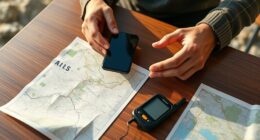To budget for your next road trip, start by evaluating your savings and monthly expenses to set a realistic limit. Estimate fuel costs by mapping routes and checking your vehicle's efficiency. Plan for accommodation by comparing budget hotels and campgrounds, and allocate around $30 a day for food by mixing dining out with cooking. Don't forget to include a buffer for unexpected costs. Keep exploring to discover more tips for an exciting journey!
Key Takeaways
- Evaluate your savings and monthly expenses to set a realistic budget limit for the trip.
- Estimate fuel costs by mapping your route and considering your vehicle's efficiency.
- Allocate a daily food budget of around $30, planning meals and snacks in advance.
- Research and compare accommodation options, aiming for budget hotels or campgrounds to save money.
- Create a contingency fund of at least $200 for unexpected expenses during the trip.
Understanding Road Trip Budgeting
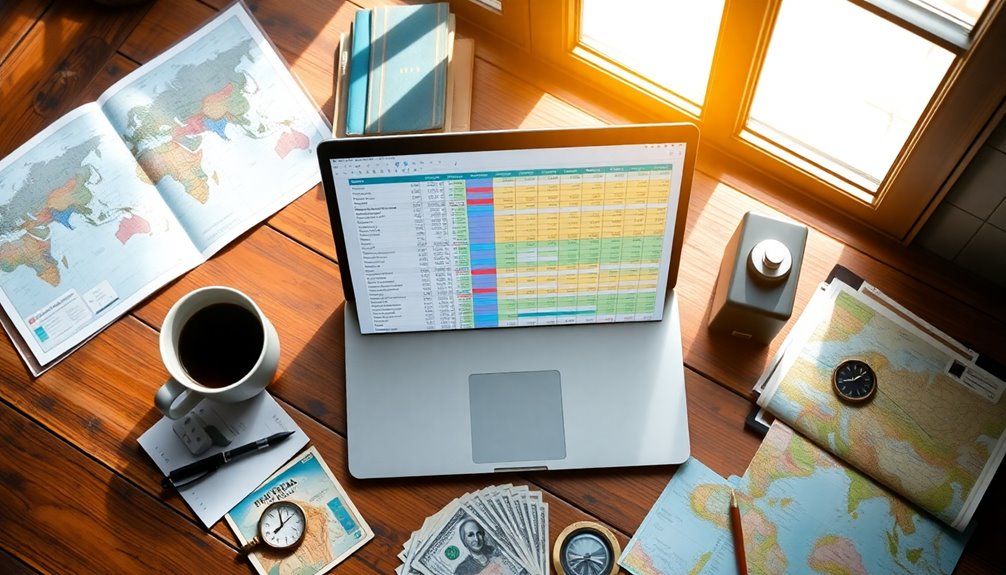
Understanding road trip budgeting is vital if you want to enjoy your journey without financial stress. Your road trip budget serves as a financial roadmap, helping you allocate funds for necessary needs like fuel costs, food budget, and accommodation.
Expenses can add up quickly, so planning ahead is critical. By setting a clear budget limit, you can prioritize spending and make informed choices about activities. This organization allows you to address unexpected expenses without derailing your trip.
Plus, a budget-friendly mindset encourages an adventurous spirit while maintaining financial control. Ultimately, sticking to your budget guarantees you meet your necessary needs, all while enjoying the journey to the fullest.
Setting and Estimating the Budget
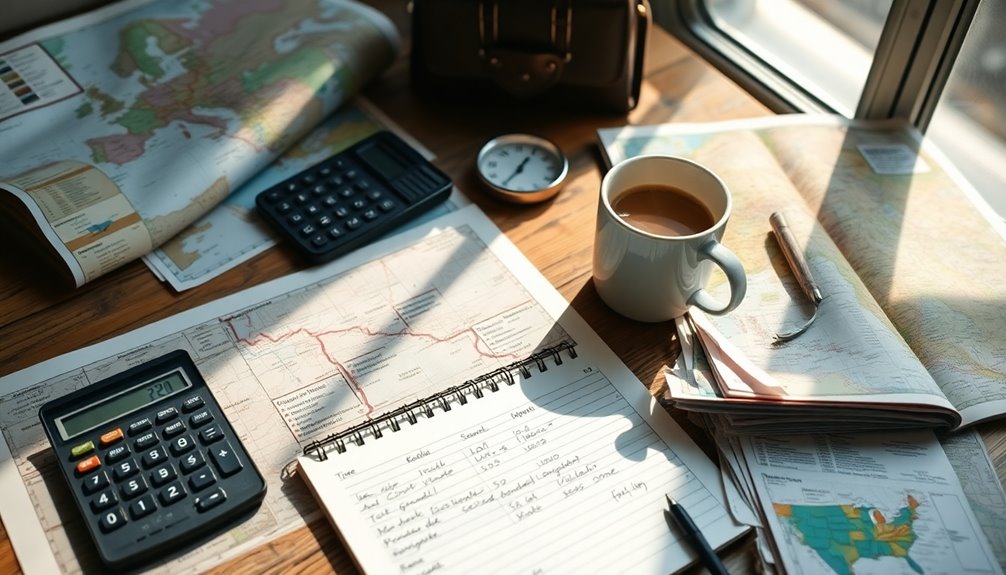
After you've grasped the basics of road trip budgeting, it's time to set and estimate your budget. Start by evaluating your savings and monthly expenses to determine a realistic total budget limit for your trip.
Next, estimate your fuel cost by mapping your route and checking your vehicle's fuel efficiency and current fuel prices. Remember, road trip costs can add up quickly!
Factor in accommodation expenses by comparing various lodging options and consider booking early for better rates.
Allocate a daily food budget, planning meals and packing snacks to curb dining out expenses.
Finally, include a buffer for unexpected expenses like tolls and maintenance to guarantee your budget can handle any surprises during your journey. Additionally, consider establishing an emergency fund to ensure you have financial stability during unexpected situations on your trip.
Planning for Accommodation and Food
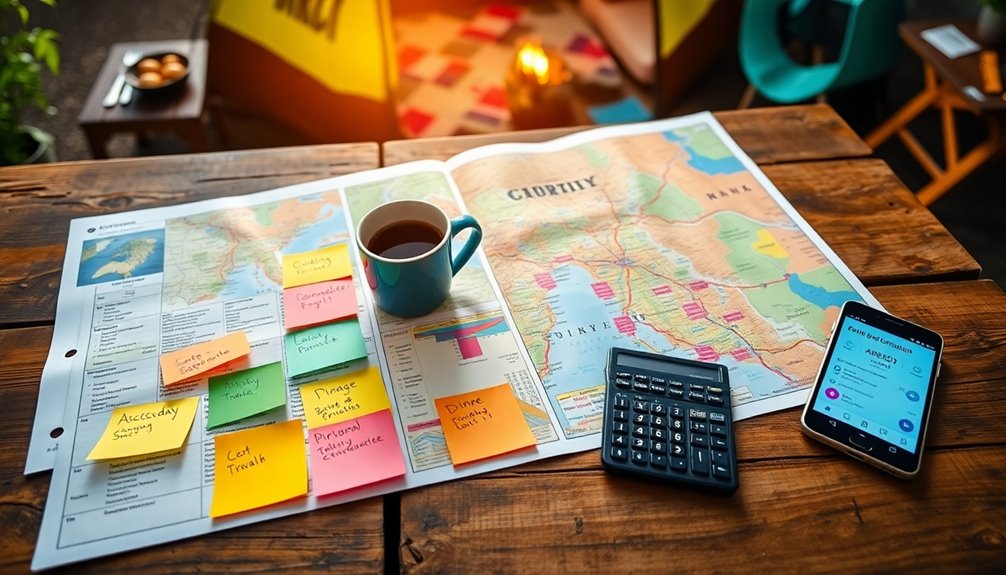
When planning your road trip, it's essential to carefully consider your accommodation and food options to keep costs manageable. Explore a range of lodging options like budget hotels ($50-$100 per night) and affordable campgrounds ($10-$40). Booking in advance can lead to better rates. For meals, mix dining out with cooking your own meals; while restaurant meals average $13, cooking costs about $4 per person. Aim for a daily food budget of around $30 for snacks and meals. Look for accommodations with complimentary breakfasts to cut food expenses. Additionally, consider how off-peak seasons can help you find lower prices on lodging as well.
| Lodging Options | Cost Range | Tips |
|---|---|---|
| Budget Hotels | $50 – $100/night | Book in advance |
| Affordable Campgrounds | $10 – $40/night | Use camping apps |
| Complimentary Breakfast | Free | Start your day conveniently |
| Cooking in Vehicle | ~$4/meal | Save on food expenses |
| Snacks | Variable | Pack to reduce costs |
Budgeting for Activities and Miscellaneous Costs
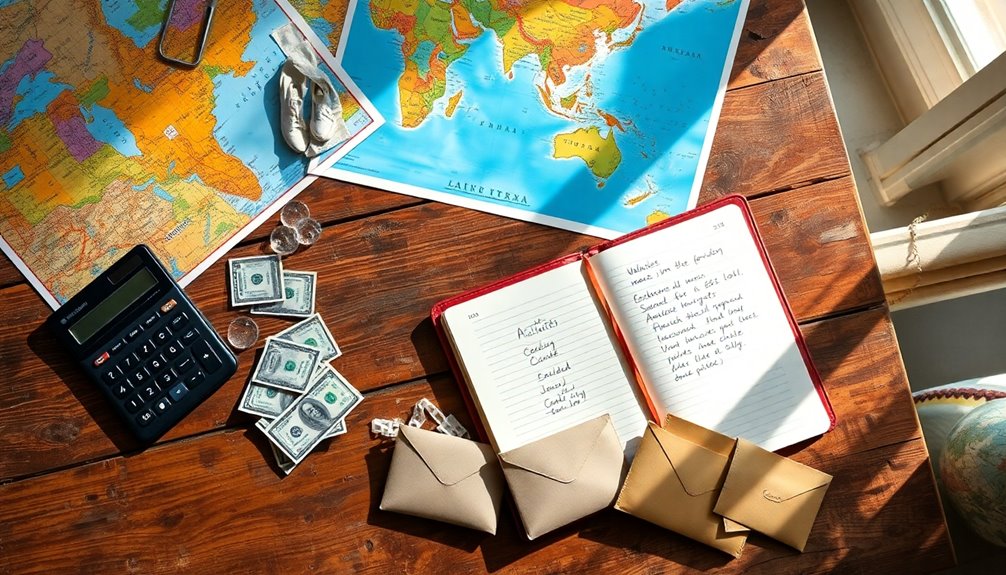
When planning your road trip, it's crucial to budget for attractions and activities that excite you.
Be sure to research admission fees, parking costs, and any extras like guided tours so you don't get caught off guard.
Don't forget to set aside some funds for miscellaneous expenses, like tolls and spontaneous treats, to keep your adventure stress-free.
Attractions and Activities Budgeting
Budgeting for attractions and activities can feel overwhelming, but it doesn't have to be. Start by creating a bucket list of desired experiences to prioritize your spending.
Research admission fees and additional costs, like parking and guided tours, to estimate expenses accurately. Look for discounts or combo tickets to help stretch your budget further.
Allocate a specific amount for daily entertainment expenses, including snacks or local treats, to keep everything on track.
Don’t forget to include a contingency fund for unexpected activity costs or spontaneous adventures that may pop up. Additionally, consider how every journey has a story to tell, as this can enrich your travel experience and influence your budgeting decisions. Planning your trip with a contingency fund ensures that you’re prepared for anything, allowing you to embrace surprises with open arms. For those moments when you’re unwinding at your destination, consider bringing along some travel games for couples to enhance your bonding experience. These games can provide entertainment during downtime and help create lasting memories, making your journey not just about the destination but also about the shared experiences along the way.
Miscellaneous Cost Considerations
Although planning for a road trip often focuses on major expenses like gas and lodging, miscellaneous costs can sneak up on you if you're not careful.
To avoid unexpected expenses, make sure to budget for items that can quickly add up.
- Tolls and parking fees
- Vehicle maintenance, including oil changes
- Roadside assistance for emergencies
- Travel insurance for cancellations
- Connectivity costs for navigation apps
Preparing for the Trip and Useful Tools
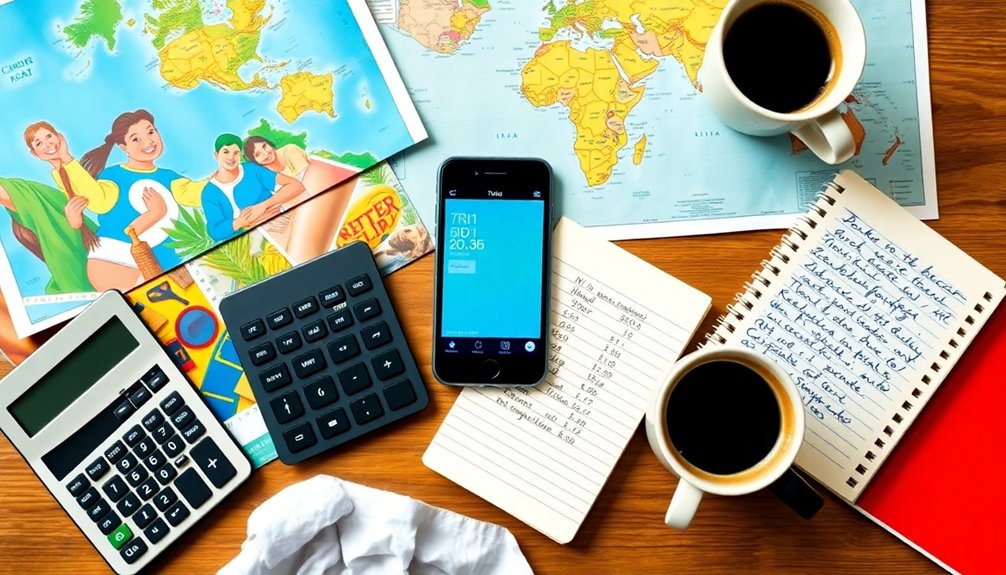
To guarantee a smooth and enjoyable road trip, proper preparation is key. Start by setting up an emergency fund with at least $200 for unexpected costs like repairs or last-minute accommodations.
Use budgeting apps like Trail Wallet to track travel expenses in real-time, keeping your budget in check. Download GasBuddy to find the cheapest fuel prices along your route, helping you minimize gas expenses.
A flexible itinerary is essential, so plan for potential route changes and monitor conditions with apps like Waze for real-time updates.
Finally, create a detailed packing list before you leave to avoid unexpected purchases and make sure you have everything you need for an enjoyable journey. Additionally, consider setting savings goals to manage your travel budget effectively and ensure you have enough funds for all planned activities.
Happy travels!
Final Thoughts on How to Budget for a Road Trip
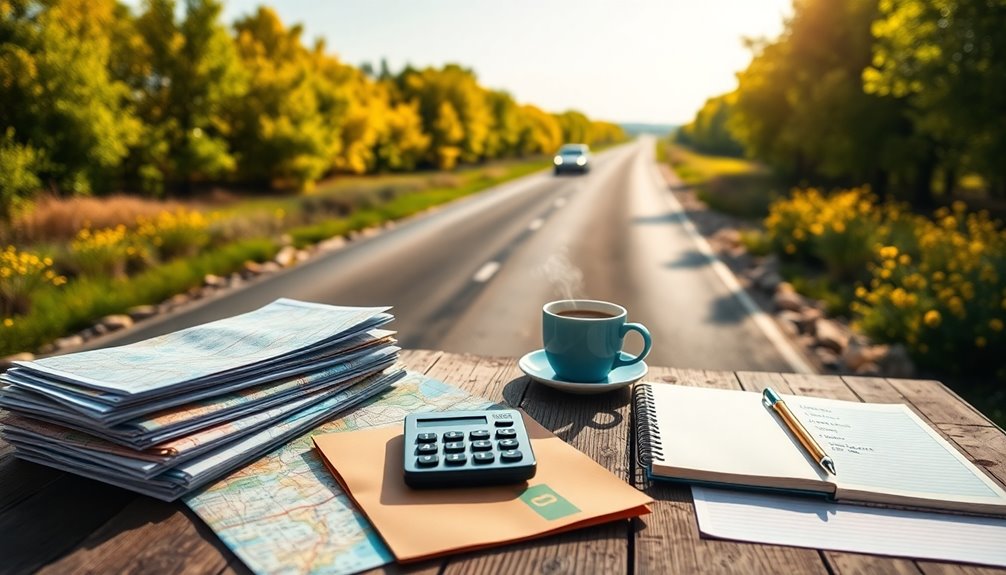
Once you've prepared for your road trip with the right tools and a solid plan, it's time to focus on the overall budget. A well-thought-out budget should cover essential expenses while allowing for some flexibility to enhance your travel experience.
Aim to allocate funds for:
- Gas
- Food
- Accommodations
- Activities
- Unexpected expenses
Consider budgeting around $1,000 for long trips or about $150 daily for shorter ones. Keep food costs down by cooking meals instead of dining out.
Set aside an additional $200 for unforeseen expenses, ensuring you can handle emergencies or spontaneous activities.
Finally, use budgeting tools and apps to track your expenses throughout the trip, keeping your spending in check and allowing for timely adjustments.
Frequently Asked Questions
How Much Money Should You Budget for a Road Trip?
When planning your road trip, it's essential to budget wisely. For a longer journey, aim for around $1,000, while shorter trips might average $150 per day.
Factor in daily expenses like $20 for snacks, $30 for gas, and $100 for accommodations.
Don't forget to calculate fuel costs based on mileage and fuel economy. Setting aside an extra $200 for unexpected expenses can save you from stress during your adventure.
How to Calculate Costs for a Road Trip?
Picture the open road stretching before you, the engine purring with anticipation.
To calculate your road trip costs, start with gas—divide your round trip mileage by your vehicle's miles per gallon, then multiply by the average fuel price.
Next, estimate food expenses by figuring daily meal costs for your trip length.
Don't forget lodging and activities!
Finally, add a contingency fund for unexpected surprises, ensuring you're ready for adventure.
How to Road Trip Affordably?
To road trip affordably, you'll want to plan your expenses carefully. Aim for around $1,000 for long trips, or about $150 daily for shorter ones.
Use apps like GasBuddy to find the cheapest gas prices. Cook meals instead of dining out, as it saves money.
Consider staying at campgrounds or with friends to cut lodging costs. Always set aside an extra $200 for unexpected expenses, ensuring you're prepared for anything.
What Is a Normal Budget for a Trip?
What's a normal budget for a trip?
Typically, you'll want to set aside around $1,000 for longer journeys or about $150 daily for shorter ones.
Break it down: allocate around $20 for snacks, $30 for gas, and $100 for accommodations each day.
Don't forget to account for meals and an extra $200 for unexpected expenses.
Conclusion
Budgeting for your next road trip can make all the difference in ensuring a fun and stress-free adventure. Did you know that the average American road trip costs about $1,200? By planning ahead and estimating your expenses for gas, food, and accommodations, you can keep your costs in check. Don't forget to set aside some funds for unexpected activities and souvenirs! With a solid budget, you can fully enjoy the journey and create lasting memories.









